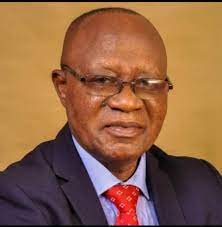The Centre Director, Centre for Logistics and Transport Education, Mr. Francis Ehiguese has fingered the road transport infrastructure as the source of congestion landwards.
Ehiguese who made this revelation while delivering a paper at a workshop organized in Lagos recently by the Chartered Institute of Logistics and Transport (CILT), Nigeria, with the theme, “Port Environment and Infrastructure Development, A Panacea for Landward Decongestion”, also fingered port internal factors such as failed or failing internal road network, parking facilities (road sides, terminal holding bays); delayed cargo pick-ups either at shipside or terminals; partial or lack of processes digitization by operators or shipping companies as well as undue delays in customs cargo clearance and release processes and procedures among others as inducing landward congestion.
He noted that road infrastructure purposefully designed and built to specification is the panacea for laying a good and sustainable foundation for quality road infrastructure, whether in port area or other places.
He believed that no port functions maximally without well paved road leading to it noting that parking facilities at ports, terminal bays and transits are also critical.
“There are no magic wands to solving road traffic congestion at port areas and environment without adequate infrastructure. It is as certain as death. Provide good, strong and sustainable road infrastructure, issues of landward congestion would be resolved”, he said.
He insisted that Nigeria has not fared better as all roads leading to ports in Lagos, Port Harcourt, Warri, among others are in sorry states adding that truck-trailers, truck-tankers, other types of goods carrying vehicles and other motorists bear the brunt of traffic woes.
“The bad situations of road transport infrastructure linking and within Apapa are beyond description. Simply put, horrendous. In a nutshell, the causes of congestion in any port area and environment, Nigeria not an exception are: failed road infrastructure and the reluctance or refusal of government to do the needful; refusal to show that the problem exist and institutional pretenses that the issues are being addressed; systematic destruction of organized traffic flow through mismanagement by intention; a system that is dominated by a few compradors with access to powers that be; weak sanctioning regimes; corruption in different shapes and magnitudes among others”, he posited.
He argued that for the road mode to play its role without causing hardship, there is the need for: specially built road infrastructure, taking cognizance of vehicle tonnage, sizes, axle load, intensity/expected length of use; the provision of parking lots and holding bays; highly organized and structured maintenance of infrastructure; provision of road furniture that facilitate interactions of users; budgetary provision on infrastructure devoid of politicization, undue fluidity as well as well thought out policy essentially on road transport infrastructure.
He however pointed out that situations at port areas and environment suggest the contrary to the above.
Speaking on port within community and issues thereto, the Centre Director noted that a number of ports that were far away from communities have closed in with ports, making the ports to be within such communities.
According to him, “Lagos is one of such cities and the implications are glaring: port superstructure like warehouses, tank farms, industrial production, parking lots, residences, amongst others are now within the port area. Traffic generated from these business concerns are quite substantial on the roadways and have become an albatross. What is the way forward: Move the port or the businesses out, or adopt a Mixed-Use development approach?”
Ehiguese further identified streamlining types of operating vehicles, using a policy framework underpinned by technical details along the lines of: local environment, durability, maintenance, energies (fossil fuel, solar, electric), trained manpower, among other considerations as consequential to having fit-for-use vehicles.
He continued, “Condition of the operating vehicles varies in some forms. The vehicles conditions may be classified as roadworthy, semi roadworthy and not roadworthy. From what we see, vehicles operated by organized private sector companies are better maintained; those belonging to registered companies that adopt sustainable fleet management philosophy make attempts to keep their vehicles to standards, howbeit not as consistent as the later. The road transport scene is dominated by private vehicle ownership and as a consequence, many unserviceable trucks are found sprawling on the road ways.
“Since this third category is in the majority, it would unfortunately be adopted to judge the conditions of operating vehicles in use. We may then conclude, amongst others that: majority of the vehicles are in deplorable conditions; these vehicles fail all standards test required for operation, but operate in the system; these vehicles usually break down at any point of the road, causing harm to other road users; majority of these privately owned vehicles do not delivers as ascribed in the contract of carriage, etc.”
He therefore called for introduction of a policy framework and regulations prohibiting rickety vehicles operating in freight carriage even as he suggested that haulers with 1 to 5 vehicles should enter into partnership to consolidate their material and human resources to fit in and be in a position to compete among others.
Photo: Centre Director, Centre for Logistics and Transport Education, Mr. Francis Ehiguese
Send your news, press releases/articles to augustinenwadinamuo@yahoo.com. Also, follow us on Twitter @ptreporters and on Facebook on facebook.com/primetimereporters or call the editor on 07030661526, 08053908817.

